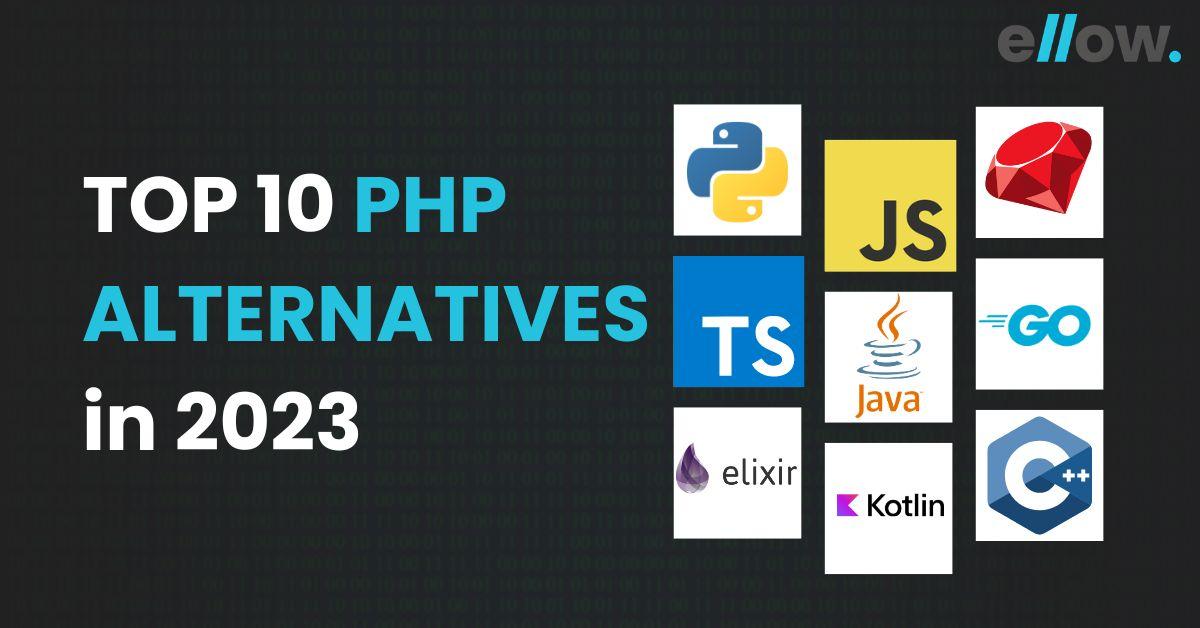
Let’s build the future together.
Great ideas need great people. Partner with us to bring your vision to life, or take the first step in your career by joining our team of innovators.

PHP is a widely used computer programming language. According to Stack Overflow, it has been in the top 10 for the last decade. It makes sense, given that it has a reputation for being reliable, having an open-source distribution, being easy to use, and having a low barrier to entry.
But for many applications, it is not the ideal option due to security issues, a lack of debugging options, or the availability of more sophisticated alternatives.
In this article, we’ll look at the top ten PHP alternatives in 2023, catering to web developers or organizations looking for alternative ways for software or application development.
We will look at ten of the most effective alternatives to PHP that we have mentioned on our list.
Applications without server-side parts don’t meet today’s standards. This is why there are various tools and programming languages available today for server-side app development. Because of its ease of use and incredible functionality, PHP is currently the most popular language for this purpose. Even though it offers a wide range of performance and usability features, it is not always the best option.
Before we delve into the alternatives, let’s quickly review some of the advantages of PHP that have made it popular over the years:
Let’s look at some of the disadvantages.
Many people believe that JavaScript (JS) is the greatest PHP substitute for web development. It is the most widely used programming language in the world, and since it has so many powerful frameworks, it is utilized for developing both desktop and mobile applications.
JavaScript has the following benefits:
Around the world, software developers used JavaScript and HTML/CSS the most frequently as of 2022, with over 63.6 percent of respondents reporting using JavaScript and just over 53 percent claiming to use HTML/CSS.
Python, SQL, and TypeScript, along with JavaScript and HTML/CSS are the top five most used programming languages worldwide.
Limited server-side capabilities and potential cross-browser compatibility issues are some of the disadvantages of JavaScript.
Sign up with ellow, and access 25,000+ pre-vetted profiles, and start building your software development team in 48 hours.
For server-side development, Python has surpassed PHP in recent years. One of the easiest programming languages on this list to learn and use is probably Python. Django and Flask make Python one of the most preferred programming languages. Other than server-side development, Python is commonly used to create algorithms for machine learning.
A disadvantage of Python is its slower performance for CPU-intensive tasks. Python is best suited for web development, data analysis, machine learning, and scripting.
Ruby is a strong, dynamic language that prioritizes performance and simplicity. Ruby reached new heights thanks to Rails, an MVC web development framework. Rails’ emphasis on rapid prototyping helped it become a well-known framework among developers.
Ruby on Rails is impressive, even with other Ruby frameworks like Sinatra, Kuba, and Hana around. Ruby has slower performance for intensive applications.
Regular online applications, e-commerce, specialized database solutions, and rapid prototyping are the main uses of Ruby.
Java is a typed, object-oriented language that requires programmers to write cleaner, more organized code. The more significant advantages that Java provides are many.
Java can be verbose, requiring more lines of code for certain tasks compared to modern languages. Java is best suited for large-scale web applications, Android apps, and enterprise solutions.
C# is a versatile, object-oriented programming language developed by Microsoft. Known for its integration with the.NET framework, C# is designed for building Windows applications, web services, and other software solutions. Its rich toolset, strong type system, and close ties to the Microsoft ecosystem make it a powerful choice for a wide range of development projects.
Even if you know PHP well, C# is easy to learn if you’re familiar with C++ or Java. The major disadvantage is that C# is tightly coupled with the Microsoft ecosystem.
Go, often known as Golang (as in Go Language), is a relatively new language used for web development. If there is an option, we would select a more modern option, such as Golang, over Python or Java.
Go (Golang) has a smaller ecosystem compared to some more established programming languages. It is best suited for building scalable and efficient applications, particularly microservices, networking applications, and projects that require strong concurrency support.
Rust is a modern programming language and the most recent addition to our lineup. So, its maturity level might not suffice for a complete substitution of PHP; however, it remains an exciting technology worth monitoring.
Rust’s learning curve and unique ownership concepts can pose challenges for newcomers. Rust is best suited for systems programming, where memory safety, performance, and security are paramount.
Elixir, built on the Erlang virtual machine, offers a compelling alternative to PHP. With its focus on fault tolerance, real-time capabilities, and strong concurrency support, Elixir excels at building scalable and robust web applications.
Elixir’s smaller community compared to some other programming languages can lead to fewer available resources and support. Elixir is best suited for building fault-tolerant and real-time applications that demand strong concurrency, scalability, and distributed system capabilities.
Kotlin is a typed programming language that runs on the Java Virtual Machine and converts to Java bytecode. It is a cutting-edge object-oriented language that makes it possible to create source documents.
Kotlin’s limited adoption beyond Android development might restrict its application in certain domains. Also, Kotlin is an ideal fit for Android app development, offering concise syntax, null safety features, and seamless interoperability with Java.
A superset of JavaScript, TypeScript includes interfaces and static typing. It enhances tooling and boosts code quality. Finds mistakes early in the development cycle. Requires translation to JavaScript, which makes the development process more difficult. Projects that focus on scalability and maintainability for large-scale online applications
The disadvantage of TypeScript is that its learning curve might be steeper for developers who are not familiar with static typing, especially when compared to dynamically typed languages like JavaScript. TypeScript is best suited for large-scale web applications that prioritize maintainability, as static typing and other modern features enhance code quality and scalability.
The ideal PHP alternative for you will heavily depend on your specific needs, requirements, and the context in which you’re looking to use the language. Let’s break down these alternatives based on some general criteria:
For web development and front-end applications:
For data science and machine learning:
For general-purpose web back-end development:
For system-level programming and performance:
For mobile application development:
For scalable and concurrent applications:
In conclusion, the best PHP alternative for you will depend on your project requirements, performance needs, scalability considerations, and your personal or team’s expertise. It’s essential to consider the specific context in which you’re looking to use the language.
Since 71.4% of all active websites use PHP, it is still more than relevant. It benefits from a variety of factors, including simplicity, popularity, and a large number of web frameworks.
However, there are instances where other options can outshine PHP in web development. Large portions of code can be reused with JavaScript, which operates on both the front-end and back-end systems. Java performs better. Ruby is more secure, and Python provides better development speed.
Are you a web developer interested in finding a job? Discover Ellow, then quickly connect to the global network.
Recommended Read:
Top 10 Global PHP Website Examples
Sign up with ellow, and access 25,000+ pre-vetted profiles, and start building your software development team in 48 hours.
Exploring alternatives widens your toolkit and allows you to match the language to your project’s needs.
Python, Ruby, and JavaScript are all solid choices, each with its strengths in web development.
Many alternatives have extensive documentation and vibrant communities, making the transition relatively seamless.
Yes, Kotlin is notable for its success in Android app development, while Swift is tailored for iOS and macOS applications.
While sticking with what you know can be comforting, venturing into new languages can lead to fresh perspectives and innovation.
Great ideas need great people. Partner with us to bring your vision to life, or take the first step in your career by joining our team of innovators.
Looking to build your career in development? team@ellow.io